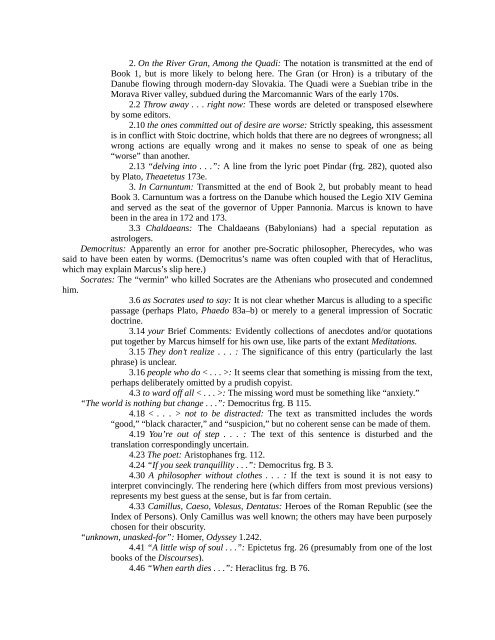9781945186240
Create successful ePaper yourself
Turn your PDF publications into a flip-book with our unique Google optimized e-Paper software.
2. On the River Gran, Among the Quadi:: The notation is transmitted at the end of<br />
Book 1, but is more likely to belong here. The Gran (or Hron) is a tributary of the<br />
Danube flowing through modern-day Slovakia. The Quadi were a Suebian tribe in the<br />
Morava River valley, subdued during the Marcomannic Wars of the early 170s.<br />
2.2 Throw away . . . right now:: These words are deleted or transposed elsewhere<br />
by some editors.<br />
2.10 the ones committed out of desire are worse:: Strictly speaking, this assessment<br />
is in conflict with Stoic doctrine, which holds that there are no degrees of wrongness; all<br />
wrong actions are equally wrong and it makes no sense to speak of one as being<br />
“worse” than another.<br />
2.13 “delving into . . .”:: A line from the lyric poet Pindar (frg. 282), quoted also<br />
by Plato, Theaetetus 173e.<br />
3. In Carnuntum:: Transmitted at the end of Book 2, but probably meant to head<br />
Book 3. Carnuntum was a fortress on the Danube which housed the Legio XIV Gemina<br />
and served as the seat of the governor of Upper Pannonia. Marcus is known to have<br />
been in the area in 172 and 173.<br />
3.3 Chaldaeans:: The Chaldaeans (Babylonians) had a special reputation as<br />
astrologers.<br />
Democritus:: Apparently an error for another pre-Socratic philosopher, Pherecydes, who was<br />
said to have been eaten by worms. (Democritus’s name was often coupled with that of Heraclitus,<br />
which may explain Marcus’s slip here.)<br />
Socrates:: The “vermin” who killed Socrates are the Athenians who prosecuted and condemned<br />
him.<br />
3.6 as Socrates used to say:: It is not clear whether Marcus is alluding to a specific<br />
passage (perhaps Plato, Phaedo 83a–b) or merely to a general impression of Socratic<br />
doctrine.<br />
3.14 your Brief Comments:: Evidently collections of anecdotes and/or quotations<br />
put together by Marcus himself for his own use, like parts of the extant Meditations.<br />
3.15 They don’t realize . . . :: The significance of this entry (particularly the last<br />
phrase) is unclear.<br />
3.16 people who do < . . . >:: It seems clear that something is missing from the text,<br />
perhaps deliberately omitted by a prudish copyist.<br />
4.3 to ward off all < . . . >:: The missing word must be something like “anxiety.”<br />
“The world is nothing but change . . .”:: Democritus frg. B 115.<br />
4.18 < . . . > not to be distracted:: The text as transmitted includes the words<br />
“good,” “black character,” and “suspicion,” but no coherent sense can be made of them.<br />
4.19 You’re out of step . . . :: The text of this sentence is disturbed and the<br />
translation correspondingly uncertain.<br />
4.23 The poet:: Aristophanes frg. 112.<br />
4.24 “If you seek tranquillity . . .”:: Democritus frg. B 3.<br />
4.30 A philosopher without clothes . . . :: If the text is sound it is not easy to<br />
interpret convincingly. The rendering here (which differs from most previous versions)<br />
represents my best guess at the sense, but is far from certain.<br />
4.33 Camillus, Caeso, Volesus, Dentatus:: Heroes of the Roman Republic (see the<br />
Index of Persons). Only Camillus was well known; the others may have been purposely<br />
chosen for their obscurity.<br />
“unknown, unasked-for”:: Homer, Odyssey 1.242.<br />
4.41 “A little wisp of soul . . .”:: Epictetus frg. 26 (presumably from one of the lost<br />
books of the Discourses).<br />
4.46 “When earth dies . . .”:: Heraclitus frg. B 76.


